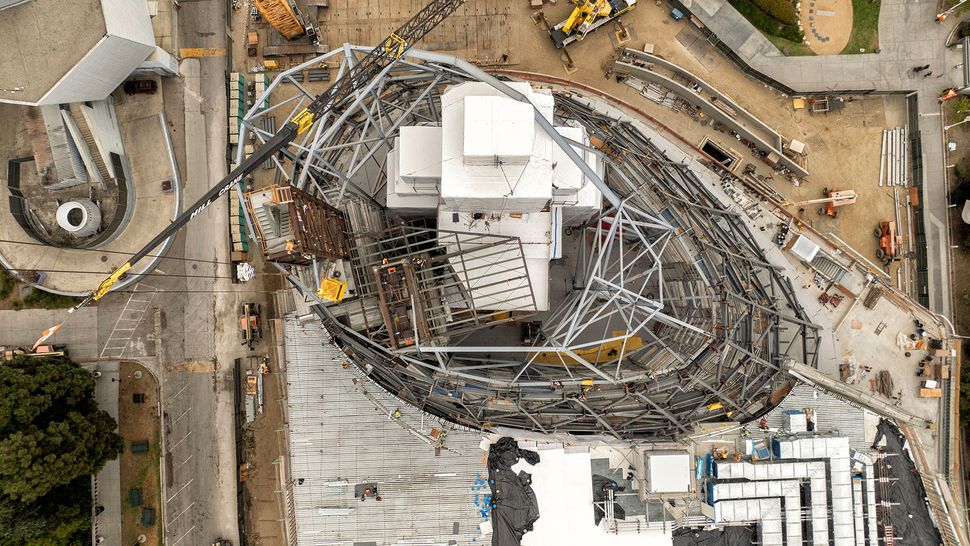The new home of NASA’s retired space shuttle Endeavour has reached new heights, and the California Science Center is celebrating with a “topping off” ceremony.
Now just over a year since the science center began stacking the solid rocket boosters that went on to form the world’s only vertical, launchpad-like exhibit of a winged orbiter, the new Samuel Oschin Air and Space Center is ready for its highest installed parts. On Thursday (Oct. 10), three steel beams were raised nearly 200 feet (61 m) above the ground to crown the building’s diagrid structure.
“It is a significant milestone for the science center and for those we serve,” said Jeffrey Rudolph, president and CEO of the California Science Center, in an interview with collectSPACE.com. “It keeps us on track to complete construction of the Samuel Oschin Air and Space Center by the middle of next year.”

The steel beams, each signed by the hundreds of construction workers, project managers and science center staff and supporters who have made this 200,000-square-foot (18,600 square meters) expansion possible, were lifted one at a time, one each hour, starting at 7:30 a.m. PDT (10:30 a.m. EDT or 1410 GMT). After the beams were in place and, observing tradition, a small spruce tree was placed atop the topmost point, a ceremony (on the ground) was followed by a barbecue lunch for the whole team, including MATT Construction, ZGF Architects, building engineers Arup and Plas-Tal Manufacturing.
Related: End of year, end of exhibit: Space shuttle Endeavour goes off view for a few years
“This is another major step toward making the vision for the Samuel Oschin Air and Space Center a reality,” Lynda Oschin of the Mr. and Mrs. Samuel Oschin Family Foundation, said in a statement. “This major expansion of the science center will honor [my husband’s] legacy by inspiring generations of children to pursue lives of adventure, innovation, and discovery, and to explore careers in science, math, and engineering.”
The diagrid was chosen for the Oshin Air and Space Center because of its ability to create the illusion of being outside. A framework of diagonally intersecting steel beams, it will allow for an open interior with no columns to block sightlines.
“The angle of the roof is set for that first view, so you’re looking up at it and won’t obstruct the view of Endeavour, and then it continues past the top of Endeavour,” said Rudolph. “It was all designed to give clear and unobstructed views of the full stack from the first time you see it after a pre-show and, at the same time, maximize the volume of the space that we’re building for a number of reasons.”
The cone of the diagrid is 150 feet wide and 232 feet long (46 by 71 m), and 150 feet tall (46 m) atop a 50-foot (15 m) wall. In total, the steel weighs approximately 2 million pounds (907,000 kilograms).
With the skeleton erected, workers will next focus on installing the skin, or outer panels, of the building and removing the supports that held the diagrid as it was being erected.
“The first thing they need to do before they do anything else is start disassembling and taking out the temporary structure within the building. Like an arch, the diagrid did not support itself until it was completed,” Rudolph told collectSPACE.
Workers will also get started removing the scaffolding surrounding Endeavour, which protected the space shuttle stack while the building was erected around it.
The Oschin Air and Space Center building is expected to be completed by next summer, but it will still be a year or more away from opening. In addition to Endeavour, the museum will house more than 100 aircraft and spacecraft, all of which need to be moved in and set up for display. Among the larger pieces will be a space shuttle solid rocket booster segment and the forward section of a Korean Air Boeing 747 jetliner.
A debut date for the Samuel Oschin Air and Space Center has not yet been set.
“We’ll schedule that after all of the exhibits and artifacts are put in and the job has been finished in a few years,” said Rudolph.
Follow collectSPACE.com on Facebook and on X at @collectSPACE. Copyright 2024 collectSPACE.com. All rights reserved.